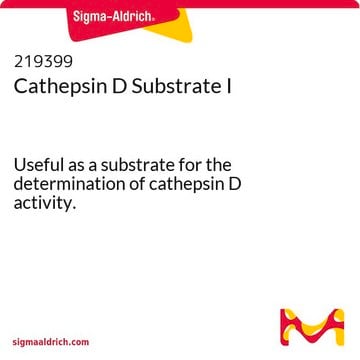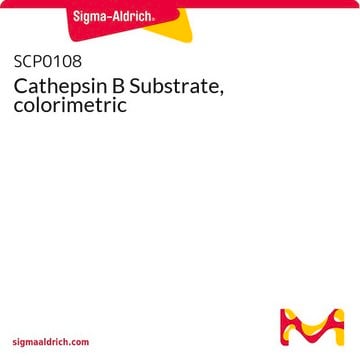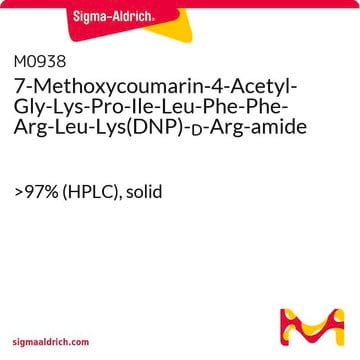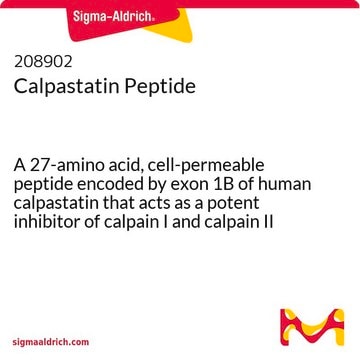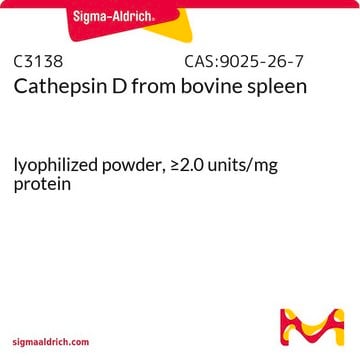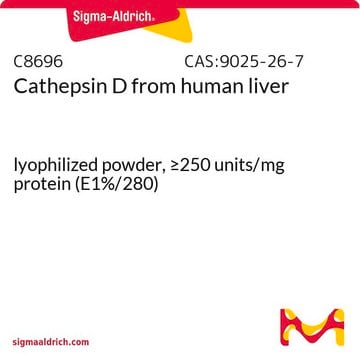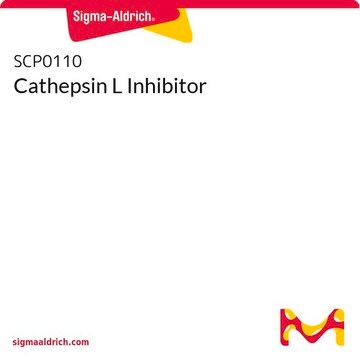SCP0109
Cathepsin D Substrate
≥95% (HPLC), lyophilized
Anmeldenzur Ansicht organisationsspezifischer und vertraglich vereinbarter Preise
Alle Fotos(1)
About This Item
Empirische Formel (Hill-System):
C49H55N9O7
Molekulargewicht:
882.02
UNSPSC-Code:
12352202
NACRES:
NA.32
Empfohlene Produkte
product name
Cathepsin D Substrate,
Assay
≥95% (HPLC)
Form
lyophilized
Zusammensetzung
Peptide Content, ≥85%
Lagerbedingungen
protect from light
Lagertemp.
−20°C
Amino Acid Sequence
Bz-Arg-Gly-Phe-Phe-Pro-4M2NA
Allgemeine Beschreibung
Cathepsin D Substrate is a peptide with Bz-Arg-Gly-Phe-Phe-Pro-4M2NA sequence.
Anwendung
Cathepsin D Substrate has been used in cathepsin D enzymatic assays with Dictyostelium, midgut samples of beetles Stromatium fulvum (Villers) and of P. versicolora.
Lagerklassenschlüssel
11 - Combustible Solids
WGK
WGK 3
Flammpunkt (°F)
Not applicable
Flammpunkt (°C)
Not applicable
Analysenzertifikate (COA)
Suchen Sie nach Analysenzertifikate (COA), indem Sie die Lot-/Chargennummer des Produkts eingeben. Lot- und Chargennummern sind auf dem Produktetikett hinter den Wörtern ‘Lot’ oder ‘Batch’ (Lot oder Charge) zu finden.
Besitzen Sie dieses Produkt bereits?
In der Dokumentenbibliothek finden Sie die Dokumentation zu den Produkten, die Sie kürzlich erworben haben.
Kunden haben sich ebenfalls angesehen
Digestive proteolytic profile in Stromatium fulvum Villers (Coleoptera: Cerambycidae)
ZIBAEE A, et al.
Romanian Journal of Biochemistry, 51, 17-30 (2014)
Robert J Huber et al.
Cellular signalling, 58, 79-90 (2019-02-17)
Mutations in CLN3 cause a juvenile form of neuronal ceroid lipofuscinosis (NCL). This devastating neurological disorder, commonly known as Batten disease, is currently untreatable due to a lack of understanding of the physiological role of the protein. Recently, work in
Proteolytic activity in Plagiodera versicolora Laicharting (Coleoptera: Chrysomelidae): Characterization of digestive proteases and effect of host plants
Zibaee A and Hajizadeh J
Journal of Asia-Pacific Entomology, 16, 329-334 (2013)
Hong-Ye Wan et al.
Advanced science (Weinheim, Baden-Wurttemberg, Germany), 5(3), 1700585-1700585 (2018-03-30)
Targeting protein degradation is recognized as a valid approach to cancer therapy. The ubiquitin-proteasome system (UPS) and the autophagy-lysosome pathway are two major pathways for intracellular protein degradation. Proteasome inhibitors such as bortezomib are clinically approved for treating malignancies, but
Tonyia Eaves-Pyles et al.
PloS one, 6(9), e24869-e24869 (2011-09-29)
Bacteria release flagellin that elicits innate responses via Toll-like receptor 5 (TLR5). Here, we investigated the fate of apically administrated full length flagellin from virulent and avirulent bacteria, along with truncated recombinant flagellin proteins in intestinal epithelial cells and cellular
Unser Team von Wissenschaftlern verfügt über Erfahrung in allen Forschungsbereichen einschließlich Life Science, Materialwissenschaften, chemischer Synthese, Chromatographie, Analytik und vielen mehr..
Setzen Sie sich mit dem technischen Dienst in Verbindung.